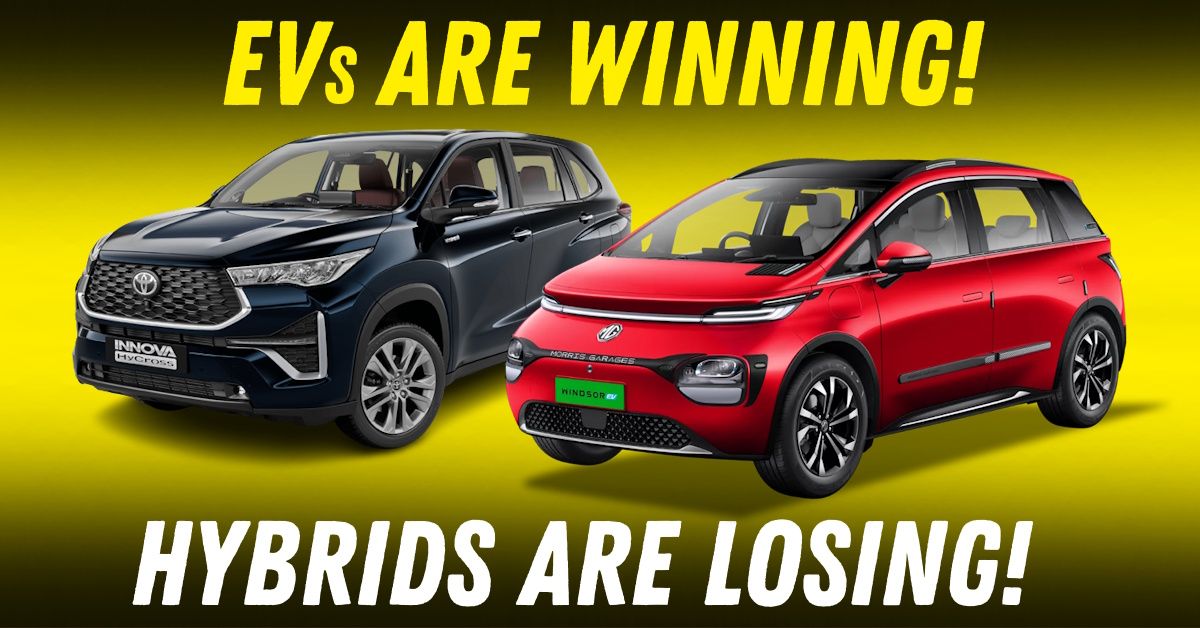Electric Cars Are Winning, Hybrids Are Losing: Proof!


The automotive landscape in India is fast evolving. We have lately been seeing a notable shift in buyer interests and preferences. In the past few months, hybrids have been gaining ground so rapidly that at least some of us started wondering if their adoption would overtake that of pure electrics. The latest data rules out these possibilities and confirms that electric vehicles continue to be more popular than hybrids, at least for now!
In the first half of 2025 (January-June), 72,128 electric vehicles were sold in the passenger vehicle space, spanning across segments. During the same period last year, 48,826 units were sold. This translates to a year-on-year (YoY) growth of 32.3%.
In the first quarter Q1- (April 2025-June 2025) of the current financial year, 39,713 EVs were sold (72% increase over the previous year's 23,057 units). The hybrid sales during the same period stood at 26,460 units- 33% less than the EV numbers.
In the larger picture, 52,587 hybrid vehicles were sold in the first half of the current calender year (January-June 2025). Last year, during the same period, the numbers stood at 51,832 units. Looking at the Q1 numbers alone, hybrid sales have grown by 118%. It remains to be seen if this momentum will be retained in the upcoming months as well.
From these numbers, it is clear that even though the Q1 numbers tend to suggest a rapid pace in EV adoption, it is the pure-electrics that tend to be more popular even today.
Well, several facts could be cited as the reason for this. First, hybrids offer the buyers very limited options to choose from. At present, the space has just a handful of players and limited models in it. Toyota, Honda and Maruti Suzuki are the only brands which offer strong hybrid products.
Of these, the last sells badge-engineered Toyotas and enjoys a market share of 18%. Hybrid models from Honda continue to be the 'less popular' picks among buyers, and the carmaker has just 1% market share as of June 2025. Toyota owns 81% of the total hybrid market. Most of these products are limited to the mass market segment. Below is a quick look at some key figures:
Now, consider the case of electric vehicles. A lot of major brands have been innovating the space recently- from Chinese big names to homegrown players. Battery Electric Vehicles (BEVs) have managed to penetrate into various segments as well- from a robust Tata Tiago to a full-blown Rolls Royce Spectre, the range is quite expansive. This means that EVs have been able to cater to diverse customer needs and portfolios, unlike hybrids. This should have also contributed to their increased acceptance.
State-level subsidies and policy backing have also led to EVs being more popular than hybrids. BEVs were incentivised heavily in the past, to boost adoption. Even today, many states and union territories like Maharashtra and Delhi continue to offer subsidies and tax benefits on these. Hybrids, on the other hand, do not get any major tax favours from the government.
The governmental push for implementing Ethanol blending in petrol may also have contributed to the slow pace of hybrid adoption, as most strong hybrids that are on sale today, have petrol engines as their bases. Blended fuel can potentially affect the efficiency of hybrid engines due to their lower energy densities. This could be worrying at least some of the potential buyers...
Even on the cost front, electric vehicles continue to be the more viable alternatives in many segments. Especially with the battery and component prices falling, many manufacturers have managed to pull off attractive (and highly competitive) price tags for their all-electric models. Hybrids on the other hand, continue to have significant price premiums over their non-hybrid petrol counterparts.